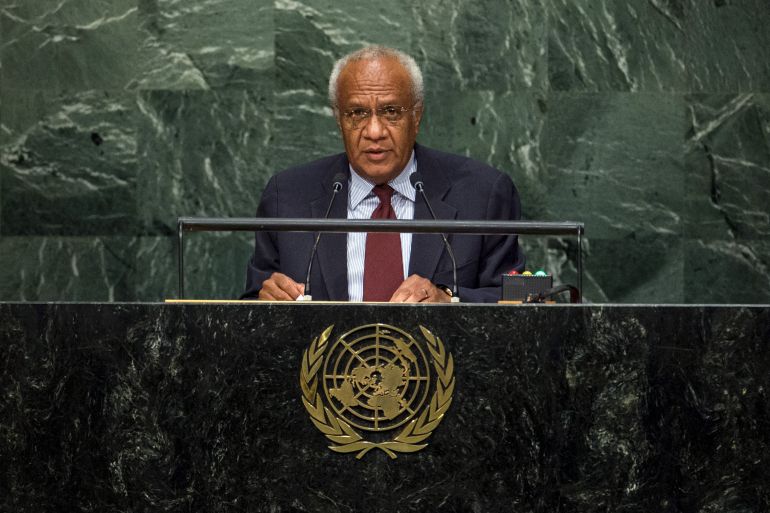Vanuatu’s Sato Kilman says he will ‘revisit’ Australia security pact
New prime minister says he will review the security pact with Australia that led to his predecessor’s removal.

Vanuatu’s new Prime Minister Sato Kilman has pledged to review a security pact with Australia after parliament voted his predecessor out over the yet-to-be ratified agreement.
Kilman told Australia’s ABC channel, in an interview broadcast on Tuesday, that Vanuatu’s parliament was unlikely to endorse the pact in its current state.
Keep reading
list of 4 items‘No one was prepared’: Vanuatu feels cost of climate crisis
Waterborne diseases surge among Vanuatu children after cyclones
Picking up the pieces after twin cyclones hit Vanuatu
“I think for us, at this point in time, I am not sure whether it is in the best interests of Vanuatu or not, only because we have not been consulted,” Kilman said in an interview broadcast by the ABC in Port Vila, a day after he came to power in a vote by legislators.
“My view would be to revisit the agreement with both sides, the Australians, and the Vanuatu government, and see if there’s any sticking points and then address that,” he said.
Vanuatu, a nation of 300,000 people, is one of the Pacific island countries at the centre of competition for influence in the region between the United States, its allies and China. The country was plunged into a political crisis last month when opposition leader Bob Loughman lodged a no-confidence petition against former Prime Minister Ishmael Kalsakau for actions including signing a security pact with Australia.
Loughman, who drew Vanuatu closer to China as the previous prime minister, said the pact compromised the country’s “neutral” status and could jeopardise development assistance from China, its biggest external creditor.
The no-confidence motion secured 26 votes, compared with 23 votes against, but the parliament’s speaker ruled it failed to win the absolute majority of 27 necessary to remove a prime minister in the 52-seat parliament. One seat was vacant and one legislator did not attend the session due to illness.
The Supreme Court ruled late last month that because one seat was vacant, the absolute majority should be 26.
Vanuatu’s speaker appealed the ruling but the court on Monday dismissed the case, paving the way for the vote for a new prime minister.
Kilman, a former prime minister and leader of the People’s Progressive Party, was elected on Monday with 27 votes in a secret ballot. Some 23 legislators voted against him.
Kilam told parliament he would “bring an end to instability in Vanuatu”and review foreign policy so that it benefitted Vanuatu more.
This is the fifth time Kilman has been elected prime minister. His most recent stint was back in 2016.
As prime minister, Kilman expelled 12 Australian Federal Police from Vanuatu in 2012, after he was stopped while transiting through an Australian airport and his adviser was arrested by Australian police on tax fraud charges.
Police cooperation between the two nations resumed in 2013 after Kilman lost office.
After returning to the top job, Kilman travelled to Beijing in June 2015 to meet with Chinese President Xi Jinping and pledged closer ties between the two countries.
The crisis in Vanuatu comes as the US and its allies seek to dissuade Pacific Island nations from establishing security ties with China after the Solomon Islands agreed to a policing pact with Beijing.
China sent police experts and equipment to Vanuatu amid the turmoil, with Beijing’s Ambassador Li Minggang saying that such cooperation would improve capacity and promote social and economic development. Vanuatu’s police force said it had “good working relations with all partners – Australia, New Zealand and China”.